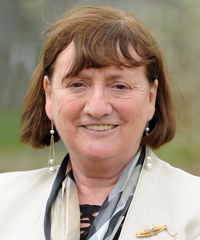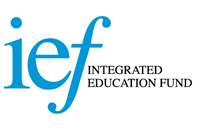Integrated Education Fund: accelerating real integration
 Integrated Education Fund Chair Marie Cowan outlines its ambitions for maximising integration in Northern Ireland’s schools.
Integrated Education Fund Chair Marie Cowan outlines its ambitions for maximising integration in Northern Ireland’s schools.
We have a window of opportunity to grow an inclusive education system in which all our children are learning together. Northern Ireland has changed significantly over the last ten years. As a society, we should not squander the immense efforts and the courage at every level that has moved us beyond conflict to becoming a more plural and multicultural place. This means working towards a Northern Ireland in which there is a sense of belonging and equal recognition of all citizens. Despite huge political progress, the shadow of the past continues to haunt the future here. Our schools cannot build a shared society on their own, yet educating all children together is an essential part of the reconciliation process and our schools have an essential civic leadership role.
The Shared Education Advisory Group, established as a Programme for Government commitment, has a unique opportunity to define and articulate what all schools might look like if they are truly to become spaces where children learn together, not apart, and which secures good education for all.
It offers us the opportunity to map out how we might reach that goal.
The Integrated Education Fund’s vision is based on a foundation of supporting both shared and integrated education over more than 20 years. Our vision is that, by 2020, schools in Northern Ireland will have taken a journey leading to equality of access and esteem for all our children. Whether these schools are called joint faith schools, national schools, local schools or integrated schools is irrelevant. We want to see that all publicly-funded schools demonstrate an ethos and practice which nurtures and respects religious, political and cultural identities. This journey will involve different routes according to different areas, demography and histories, and will involve addressing the sensitive issues that will inevitably arise as we deal with our past and work together for our future.
We believe there are certain core principles which should underpin the growth of a different kind of education system.
The best educational experience must be the ultimate aim, establishing a system which offers the best academic outcomes possible and develops each pupil’s personal potential.
Sharing and integration offer the best contribution to a cohesive society and the most sensible response to our current economic situation.
Responsiveness: the voices of citizens, in particular school communities, must be heard in the planning of new processes and in the development of a shared vision of education.
Openness: all stakeholders should be kept informed of developments and options at every step of the way.
To reach our aim, there will have to be changes in legislation, policy and procedures, leading to a change in culture which will enhance the educational experience provided in our schools. This cannot all happen at once but we can see a defined path towards achieving this aim.
• Any new Education Act should reflect the widespread support for increased integration and pave the way for changes to meet this demand. We would like to see placed on all schools in receipt of public money a duty to be “inclusive shared spaces”. This means funding allocations should favour schools making progress towards meaningful sharing: being open to children from all political, religious and cultural backgrounds that make up Northern Ireland. This would be demonstrated, for example, by governance arrangements, the delivery of the curriculum, the sensitive use of symbols and emblems, a considered approach to religious education and the provision of sporting and cultural activities.
Whilst cross-community collaboration has been encouraged by the Department of Education, we currently do not have the legislative framework to deal with the asset, governance and legal aspects of any structural changes which would reinforce this.
• The Education Act would need to facilitate the development of shared management schools, including shared faith or shared community schools, shared campuses, mergers between controlled and maintained schools, and federations;
• the Act should ensure that the single planning authority is the sole body responsible for employment in schools.
 This should, by 2014, be followed by:
This should, by 2014, be followed by:
• all primary schools welcoming post-primary schools from all sectors wishing to encourage P6 and P7 children to transfer to their school;
• the establishment of a register of parents of pre-school children which would indicate their preference for a type of school to inform area-based planning process;
• all future investment in infrastructure and capital investment clearly demonstrating contribution to good relations, integration and a shared future;
• a requirement that development proposals for new schools or re-organisation and rationalisation of schools must demonstrate that options for various models of sharing on a cross-community basis have been considered and fully explored;
• the use of the Sustainable Schools Policy to encourage greater levels of integration (in its widest sense) between different schools. The Department of Education, in meeting its good relations obligations under Section 75 (2) of the Northern Ireland Act 1998, must also ensure that when a school closes it takes steps to address potential negative impact on local community relations;
• routine secondment and employment of staff across the sectors;
• financial support to schools wishing to explore ways of integrating in its widest sense, such as sharing through mergers and amalgamations across different management types;
• funding made available to all schools wishing to accommodate a variety of belief systems – for example a controlled primary school could be resourced to deliver faith formation classes to Catholic children.
Following this, by 2015 we would expect to see:
• a school’s progress towards an inclusive and shared ethos to be verified by the Education and Training Inspectorate, using qualitative and quantitative measures, and assessment included in published inspection reports;
• collaboration between the different teacher training institutions, to ensure that all student teachers, whatever their community background, have the appropriate time and opportunity to experience education in a variety of cultural contexts.
• the exemption currently provided within the Fair Employment and Treatment Order regarding the recruitment of new teachers should be removed;
• all sectoral support bodies should now be merged into a single authority, with no separate funding from the Department.
By 2017 we want to see:
• a shared or integrated model of schooling treated as the presumed option for new housing developments, with the Department for Social Development and Department of Education developing an inter-departmental strategic approach to shared housing and shared education.
By 2018 we need:
• a unified system of initial teacher education.
These steps should take us by 2019 to the situation where all publicly-funded schools should be inclusive shared spaces where children from all backgrounds – Catholic and Protestant, of other faiths and of none – have the opportunity to learn, play and grow together in an environment which respects difference and celebrates religious, political and cultural identities. Then, in 2020, we need a review of education in order to plan to continue the vision to 2040.
 Integrated Education Fund
Integrated Education Fund
41-43 University Street
Belfast, BT7 1FY
T: 028 9033 0031 / F: 028 9066 0061
W: www.ief.org.uk






